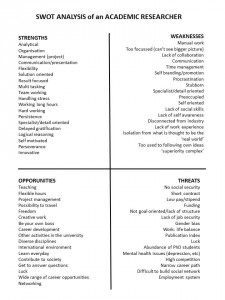What does it mean to be a PhD student or researcher in career terms? Are you aware of your strengths? What are the skills and aptitudes you have acquired to offer your next employer? Conversely, do you know where your weaknesses lie? How could you improve your situation? Perhaps a strength in one career sector, such as being highly specialised, could be considered a weakness in another. Are you aware of any opportunities available to help you to overcome your weaknesses or improve on your strengths? Perhaps there are factors beyond your control which threaten to scupper your chances of success or barriers which present challenges to you moving on in your career.
Recently, I’ve been using a new ‘tool’ in my career development workshops. The SWOT analysis is an assessment tool used by organisations to review their business and to determine strategies and decisions to take the company forward. However, I’ve found out that it can also be used very effectively at the personal level to help researchers to plan and manage their careers.
SWOT stands for: Strengths, Weaknesses, Opportunities and Threats. Fundamentally, strengths and weaknesses relate to ‘internal issues’ and opportunities and threats relate to ‘external issues’. Once completed, the SWOT analysis can help individuals to determine what they need to do to accomplish their objectives, and what obstacles must be overcome or minimised to achieve desired results.
During the past few months I’ve been running this session with postdoctoral researchers and have summarised the results of their SWOT analyses of a postdoctoral researcher below:
You may have other examples to add to these lists but, as an individual exercise, why not try choosing 3 – 5 of the most relevant to you under each of the SWOT categories. It may help you to recognise and focus in on the positive aspects of your research experience (strengths and opportunities), as well as using these to overcome the weaknesses and threats. Interestingly, you can see from the grid that, for some, an opportunity is seen as a threat (e.g. travel), and a strength can also act as a weakness (e.g. being specialist/detailed).
Depending on your career goals and other personal factors, such as your values, personality and interests, your own SWOT analysis can help you to build a positive action plan, e.g. identifying which skills you need to develop further, exploring career development opportunities to enhance your employability and address personal weaknesses, taking action to overcome or minimise external negative issues, such as improving your network.
Related content: Self leadership
Note – apologies if you have already read this post – I’m re-posting this updated version, after it recently fell off my blog 🙂
